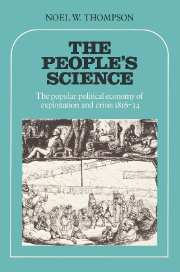Book contents
- Frontmatter
- Contents
- Preface
- Introduction
- 1 Changing attitudes to political economy in the working-class press 1816–34
- 2 The need for a working-class political economy
- 3 Charles Hall and Robert Owen: anti-capitalist and socialist political economy before the Ricardian socialists
- 4 Ricardian socialists/Smithian socialists: what's in a name?
- 5 The theory of labour exploitation and the working-class press 1816–30
- 6 The theory of labour exploitation and the working-class press 1830–34
- 7 Early socialist political economy and the theory of capitalist crisis
- 8 The popular political economy of crisis 1816-34
- Conclusion
- Bibliography
- Index
5 - The theory of labour exploitation and the working-class press 1816–30
Published online by Cambridge University Press: 14 January 2010
- Frontmatter
- Contents
- Preface
- Introduction
- 1 Changing attitudes to political economy in the working-class press 1816–34
- 2 The need for a working-class political economy
- 3 Charles Hall and Robert Owen: anti-capitalist and socialist political economy before the Ricardian socialists
- 4 Ricardian socialists/Smithian socialists: what's in a name?
- 5 The theory of labour exploitation and the working-class press 1816–30
- 6 The theory of labour exploitation and the working-class press 1830–34
- 7 Early socialist political economy and the theory of capitalist crisis
- 8 The popular political economy of crisis 1816-34
- Conclusion
- Bibliography
- Index
Summary
The approach of the radical and co-operative press 1816-24
In order to formulate a general theory of labour exploitation, it was necessary for writers to provide answers to a number of questions. First, given the diversity of productive activity in which labour was involved, it was important to determine what constituted economic value; secondly, it was necessary to decide who or what produced it; thirdly, reasons had to be given for believing that the value input of one group of producers was not matched by their value receipts; fourthly, it was necessary to establish the beneficiaries of this; and finally, it had to be shown that the deviation of group or individual value inputs from value receipts was not a once-and-for-all phenomenon but rather part of a systematic process of value abstraction from producers.
In attempting to explain the origin and nature of labour exploitation writers in the radical press worked without any coherent theory of what produced or constituted economic value. It can of course be argued that, in general terms, they regarded labour as the essential constituent of all goods and services of economic worth but what writers in the radical press tended to produce was a vindication of the noble nature or social ‘value’ of labour rather than a labour theory of value.
- Type
- Chapter
- Information
- The People's ScienceThe Popular Political Economy of Exploitation and Crisis 1816–34, pp. 111 - 135Publisher: Cambridge University PressPrint publication year: 1985



